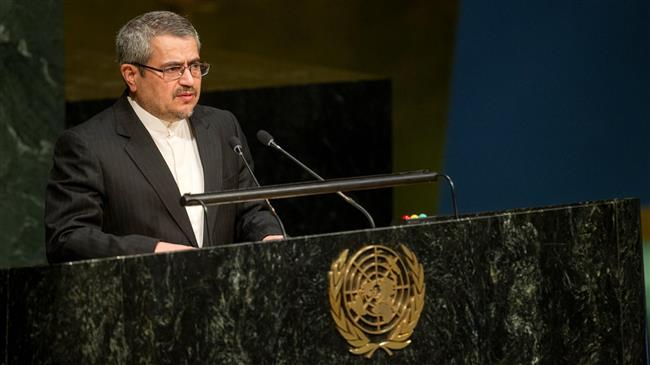Iran scolds US, Israel for unilateralism on Iran deal, embassy move


Iran says unilateral policies like the ones regularly adopted by the United States and Israel are detrimental to world peace and indicate a push towards replacing the rule of law with the “rule of power.”
“Unilateral measures, either in the form of illegal recourse to war, occupation, aggression or denying the sovereignty of member states or waiving the immunity of states under an unsubstantiated legal doctrine, are obvious manifestations of the rule of power, not the rule of law,” Gholamali Khoshroo, Iran’s ambassador to the UN, told a Security Council meeting on Thursday.
Khoshroo said US President Donald Trump’s withdrawal from the Iran nuclear deal and his recent decision to move the US embassy in Israel to Jerusalem al-Quds, which was followed by a deadly crackdown on Palestinian protesters, were two glaring examples of such “internationally wrongful acts.”
Iran nuclear deal
Earlier this month, Trump pulled out his country from the 2015 nuclear deal between Iran and the P5+1 group — the US, Britain, France, China, Russia and Germany — over claims that it did not curb Iran’s missile program and its regional influence.
The decision violated a UNSC resolution that endorsed the deal, and went against numerous confirmations by the International Atomic Energy Agency (IAEA) of Iran’s compliance with the accord.
Khoshroo said the decision to withdraw from the Joint Comprehensive Plan of Action (JCPOA) and to re-impose all nuclear-related sanctions against Tehran was yet another “material breach” of the deal by Washington.
Previous violations included “bad faith nominal implementation, undue delays, new sanctions and designations, derogatory anti-JCPOA statements, refusal to issue necessary licenses particularly in the last 16 months as well as systematic and concerted efforts to sabotage the deal by actively dissuading others to do business with Iran,” the Iranian envoy added.
Khoshroo said Trump’s move “is a regress to the failed and disastrous era of unilateralism, and encourages illegality.”
‘Illegal’ embassy move
The Iranian envoy, who was addressing a UNSC open debate titled “Upholding International Law Within the Context of the Maintenance of International Peace and Security”, said Trump and Israeli Prime Minister Benjamin Netanyahu basically “ridiculed” international law by moving the US diplomatic mission to Jerusalem al-Quds earlier this week.
“On May 14, Netanyahu and his guests celebrated the illegal move of the US embassy to Jerusalem al-Quds, violating and ridiculing international law as well as many UN resolutions regarding the situation of Jerusalem and inalienable rights of the Palestinians,” he argued.
Referring to the Israeli military’s massacre of more than 60 people who protested the move in Gaza on the same day, Khoshroo called for an end to the Israeli regime’s “total impunity” in carrying out such acts.
The move, Khoshroo said, was a “shameful violation” of the international human rights law.
“The violators shall be compelled to bear the responsibility for their wrongful acts,” he asserted.









